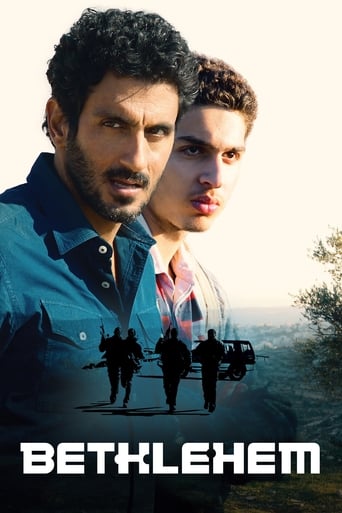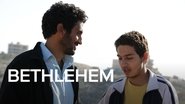Pfandgut
When we look at guilt as a the key element used in the plot of "Bethlehem", we find that it is not easily possible to define victim and perpetrator. Even though the characters were never totally free of their responsibility, they were mostly shown in the context of external forces that were stronger than their individual possibility to chose alternatives. These external forces created moral dilemmas in which the characters were caught up.Some of these were for example the codex of Arab family honor conflicted with Sanfur's individual decisions and his fathers opinion about his future in context of his brothers death. There was the psychological issue of a double agent and his personal involvement with his asset conflicting with his orders in the context of his career. Also his rationalism was blurred in the face of a hinted sexual relationship with his colleague, his ambition and his responsibility as a father and husband. Some others dilemmas were also informative for the viewer in order to understand the environment of the plot. In an almost documentary storytelling the film tells about the conflict between Palastinian and Bedouins within the leadership of the Palestinian/Arabic/Islamic militia, the fight for political strength of the Palestinian autonomy or the Al-Aqsa resistance facing religious fundamentalism. Taking these and other issues into account - the characters couldn't escape their moral dilemmas even though they wanted. They had little choices and none of the decisions were not understandable. So in the end everyone was guilty, but the damage done was greater than caused by an individual decision. Therefore this movie shows paradigmatic how the people in this complex conflict can not easily stop ongoing violence. From a western point of view this helps to understand also how naive it is to simply ask the war parties to stop their fighting. It makes us understand that once you are trapped in the spiders net of violence, you cannot stop it from evolving. In this way the movie has done a great job. But what is the second, less obvious, but more scary conclusion drawn from that? Violence is unavoidable and you cannot escape your destiny. But if this so, and everything is determent – how are you responsible for your actions? Another subject where we know this concept from is Qadar, the concept of predestination in Islam belief, which says that everything is written. Higher forces drive your actions and you cannot escape your destiny - doesn't this therefore make you less guilty? This would question legacy for a democratic legal system used in a warlike world as in this conflict. And also made me see the violence on a daily base in a different light.On the same when I saw the movie, a stabbing attack occurred in Jerusalem, clumsy executed by two teen aged Palestinian girls. The attempted terrorist attack and the murder shown in the movie are not completely alike, but yet it were both Palestinian teenagers conflicted with brutal and archaic murder. I would never justify terrorism, but in the light of what I have seen in the movie, I would say it gave me an idea of how people are driven to those acts. It was the first time I ha the glimpse of an idea how people could chose to do such things to others. I wouldn't say I feel empathy, but still I doubt that these people would have chosen their destiny if they had a real choice. And this is what I mean with scary conclusion – how should a society and legacy deal with that, if wrong is done to you, but the cause is not to be found in an individual guilt?The end, which in itself provides a strong symbolic picture (a master is killed by its tool / father is killed by its son) shows us what is left: Archaic violence is what is left. Archaic violence as a cry for help as it exceeds all necessary measures.
pc95
(spoilers)"Bethlehem" directed by Yuval Adler, is a decent suspense drama set in Israel along very similar lines to it's sister movie entitled "Omar". Here there is an overarching plot that is not as well focused as "Omar". Suffice to say about 2/3 of the way through the movie the filmmakers decide to can the initial drive of the movie and go along a different line with secondary characters. This doesn't hold as much dramatic weight. By the end we know what's going to happen and there is little if no tension. Still the movie has a good first 2/3 setup until the main character's brother is killed in fighting is fairly captivating. The editing and camera work is not the best nor is the accompanying soundtrack showing the budget constraints. 6/10
runamokprods
In a fascinating coincidence this excellent film,and Hany Abu-Assad's even better 'Omar' appeared at nearly the same time. Both tell similar stories, one from the Israeli perspective and one from the Palestinian. Both tell of a young man recruited (or forced) into being an informer for the Israelis. We see these young men torn in multiple directions, risking their lives if they are uncovered, trying to play one side against the other, finding themselves drawn ever deeper in a morass they are powerless to stop. In Bethlehem the 'hero' is only a teenager, and an immature one at that. His older brother is an accomplished terrorist/freedom fighter, leaving his little brother Sanfur without much of an identity of his own, he seems overlooked by his family and unimportant to his community. Ironically in many ways Sanfur's closest relationship is to his middle-aged Israeli 'handler', who also clearly has fatherly feelings towards the youth, further complicating the relationship. The acting is generally excellent, and there's a lot of thriller like tension to go along with the human drama. I actually saw this and 'Omar' within days of each other, and I would recommend the same approach to others. Seeing the two sides of the same coin gives a feeling of greater insight into the conundrum that is the middle-east. Also, both directors are careful not to paint black and white portraits of either side, both treat all involved as human, so the differences in perspective are both fascinating and subtle.
classicalsteve
The first scene involves some Palestinian boys engaged in an updated version of "chicken" in the desert outside of Jerusalem. Instead of some teenagers in the 1950's driving their cars off some embankment as in "Rebel without a Cause", these boys are using semi-automatic weapons and a rather worn "bullet-proof" vest. The main character of the film, Sanfur (played by Shadi Mar'i in completely convincing performance), is a Palestinian teenager who dons the vest and instructs his fellow peers to shoot him, if they have the guts. This is a game but a very brutal one. When some of the adults appear on the scene, the kids scatter. But I think the point is the adults are playing at the same brutal game, daring each other to fire at one another.The film involves three groups: two militia groups of Palestinians who are somewhat at odds with each other, Hamas and the Palestinian Authority, and their common enemy, the Israels. Sanfur is literally caught between all three who seem to be playing a very deadly game of tug-of-war. His family is sympathetic to the Palestinian Authority but he socializes with people in Hamas, the more radical of the two. At the same time, Sanfur is good friends with Razi (Tsahi Halevi in an equally compelling performance), who is in reality an Israeli agent. His agency's duty is to infiltrate the Palestinian regions near Jerusalem and Bethlehem and root out members of the Palestinian militia groups. While Ravi appears to be Sanfur's friend at one level, the Israeli is using the boy to obtain information about Hamas.The conflict begins with a decision to hunt down and assassinate a Hamas leader name of Ibrahim, whom the Israelis have been chasing for a year but is also, unfortunately, Sanfur's brother. Sanfur finds himself caught between the radical Hamas leaders, his family which appear to be on the moderate side of the conflict, and Ravi the Israeli, who has become like a father-figure for the boy. Now the boy is torn between all these loyalties. The crucial moment of the film occurs when Sanfur forces Ravi to take a kind of test of friendship. Will he succeed or fail? Will the boy side with the Palestinian authority, Hamas or with the Israeli agent? An incredibly compelling film, but a very dark one about the current hostilities between Israelis and Palestinians. The acting is outstanding, and I have read that some of the actors had never performed in a film before. The viewer feels as if he or she is with these people, almost spying on their conversations and actions. There is never a dull moment, but this is not that kind of film where the good guys and the bad guys are neatly spelled out for us.





